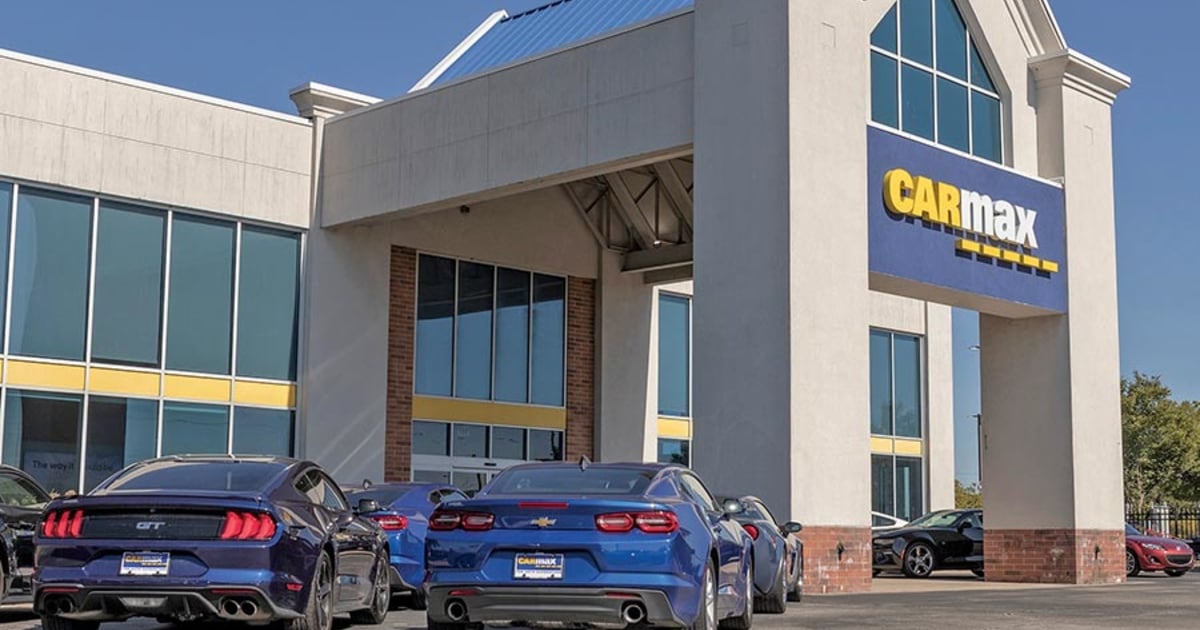
Used-car retail giant CarMax Inc. said Friday that net income slipped in its fiscal first quarter amid continuing challenges with vehicle affordability and inflation, as well as tightened lending standards and decreased consumer confidence that hindered how many vehicles it sold.
CarMax reported net income of $228.3 million in its first quarter ending May 31, down 9.5 percent year over year. The company’s net revenue was $7.7 billion, down 17 percent.
CarMax retailed 217,924 used vehicles in the quarter, down 9.6 percent from the year-earlier period. Its comparable store used-vehicle sales fell 11 percent, an improvement over last year’s third and fourth fiscal quarters. Comparable store sales fell 22 percent in the third quarter of 2022 and 14 percent in the fourth quarter.
The company also benefited from a $59.3 million legal settlement stemming from economic losses related to the decadelong industrywide recall of defective Takata airbag inflators.
CarMax reported gross profit per retail vehicle of $2,361 and gross profit per wholesale vehicle of $1,042, both about the same as a year ago. Company executives said last quarter that CarMax was giving priority to preserving those margins.
The retailer purchased 343,000 vehicles from consumers and dealers, down 5.2 percent from the year-earlier period, but up 31 percent from its fiscal fourth quarter.
“Our deliberate actions are driving improved trends in the business, despite the challenging macro environment,” CarMax CEO Bill Nash said in a statement. “Our unit performance in used, wholesale and consumer and dealer buys all improved sequentially from the year-over-year trends in the second half of fiscal year 2023. We also continued to deliver strong retail and wholesale gross profit per unit along with [selling, general and administrative] reductions.”
Credit environment
Company executives noted that CarMax’s captive finance unit, CarMax Auto Finance, continued to tighten its lending standards amid a deteriorating economic and consumer credit backdrop.
Income from that unit plunged 33 percent to $137.4 million — driven primarily by a $23 million increase in the provision for loan losses and a $94 million increase in interest expense, the company said. Despite the tightened lending standards, CarMax’s credit platform approved about 95 percent of credit applications in the quarter, said Jon Daniels, senior vice president of CarMax Auto Finance.
The period also saw the company trimming costs, something it and other used-vehicle retailers have done in the last several quarters as used-vehicle sales have softened. CarMax’s selling, general and administrative expenses declined by $37.6 million, or 5.7 percent, which includes measures to better align marketing spend to sales.
Online sales, efficiencies
About 14 percent of the company’s retail vehicle sales in the quarter were online, up from 11 percent in the year-earlier period, CarMax said. Nash said another 54 percent of retail sales were omnichannel, which refers to technology and processes aimed at providing a seamless buying experience for consumers whether they shop online, in-store or both.
Nash also noted CarMax is “increasingly leveraging” Skye, a 24/7 virtual assistant, to assist vehicle buyers via chat functionality while taking work out of its customer experience centers.
In the first quarter, the company “expanded these capabilities to include workflows related to finance applications, vehicle transfers and appointment reservations,” Nash said.
Expansion
CarMax opened one new retail location in its first quarter, in Winchester, Va. As of May 31, the company operated more than 240 stores. It plans to open five more locations in fiscal year 2024.
CarMax shares rose 9.4 percent to $85.70 in Friday afternoon trading as earnings results fared better than Wall Street expected.